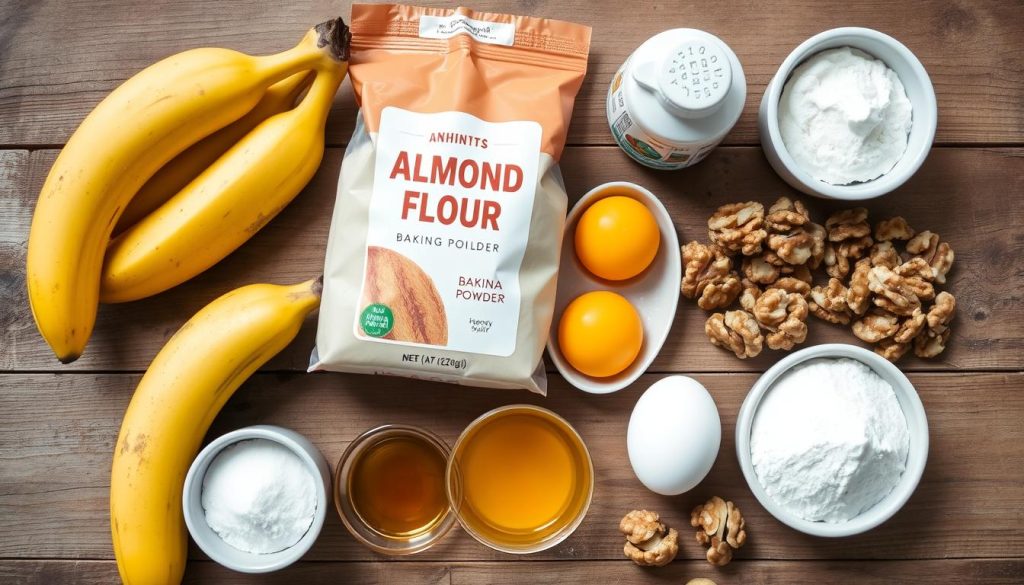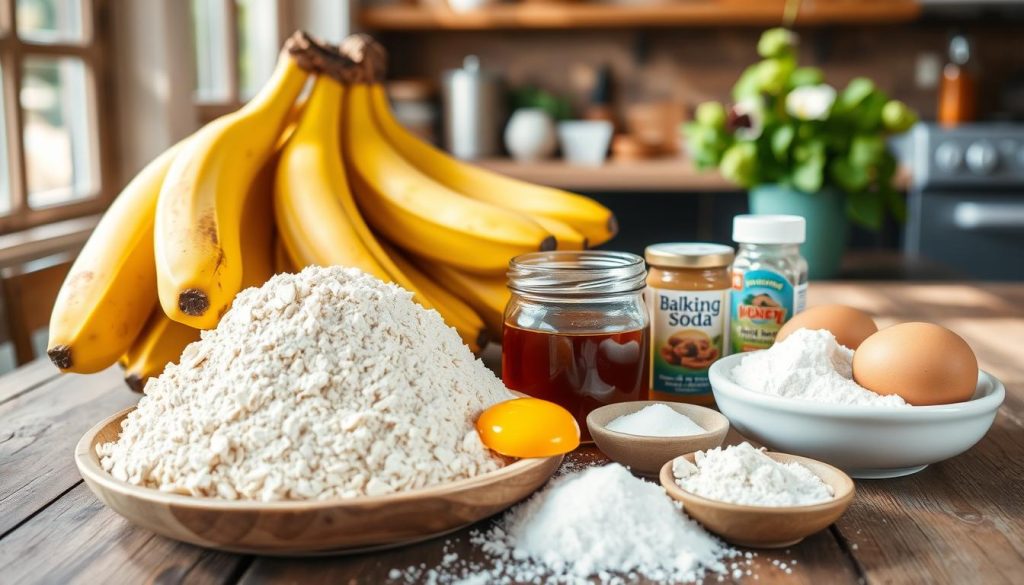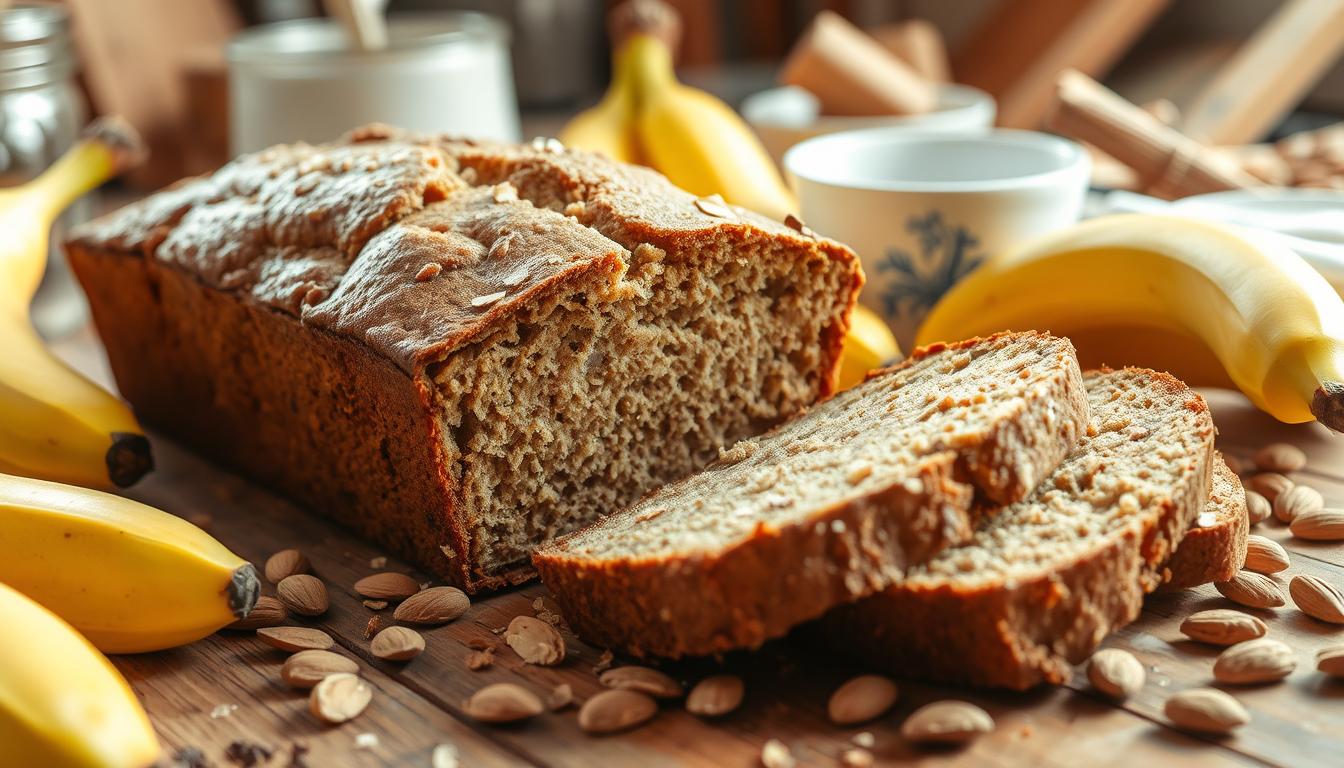Every Sunday morning, my kitchen would fill with the smell of banana bread. It reminded me of my grandmother’s recipe. But when I found out I was gluten sensitive, I thought those moments were gone. That was until I discovered almond flour banana bread.
Almond flour banana bread is more than just a recipe. It’s a tasty choice for those who need gluten-free options without losing flavor or texture. With more people looking for gluten-free foods, this recipe is a healthier take on a classic.
If you’re watching your diet or just want to bake healthier, this almond flour banana bread is for you. It’s easy to make and full of good stuff and great taste. Get ready to make your breakfast and snacks better with this recipe.
This gluten-free banana bread has only 215 calories per slice. It’s also full of nutrients. It’s going to become your go-to treat. Let’s explore how healthy eating can be delicious!
Understanding Almond Flour Banana Bread

Almond flour banana bread is a tasty twist on the classic recipe. It’s packed with nutrients and fits many diets.
What Sets It Apart from Traditional Banana Bread
Paleo banana bread with almond flour is special. It has:
- Gluten-free composition
- Higher protein content
- Lower carbohydrate profile
- Naturally nutty flavor
Benefits of Using Almond Flour
Almond flour is a nutritional gem. It offers:
- Rich in healthy fats
- Provides essential minerals
- Supports blood sugar regulation
- Enhances overall nutritional value
Key Recipe Characteristics
Healthy banana bread with almond flour is moist and flavorful. Its texture is thanks to almond flour’s oils and protein. It makes baking more enjoyable.
Essential Ingredients for Perfect Results

Creating delicious nut flour recipes needs careful ingredient selection. This is true, even more so when baking without grains. Your almond flour banana bread needs top-notch ingredients for a moist, tasty loaf.
Let’s look at the key ingredients that make this recipe stand out:
- Ripe Bananas: Pick bananas with brown spots for extra sweetness (about 3-4 bananas)
- Blanched almond flour (2.5 cups)
- Large eggs (3 count) for binding
- Sweetener options:
- Coconut sugar (1/4 cup)
- Honey
- Maple syrup
- Avocado oil (1/4 cup) for moisture
- Vanilla extract
- Baking powder
- Baking soda
- Ground cinnamon (2 teaspoons)
When picking ingredients for your nut flour recipes, quality is key. Go for fresh, organic ingredients whenever you can. Blanched almond flour gives a smoother texture, perfect for grain-free baking.
Pro tip: Make sure your bananas are very ripe. The darker and softer they are, the sweeter your banana bread will be. This natural sweetness means you can use less added sugar in your recipe.
Almond Flour vs Regular Flour: Important Differences
Exploring gluten-free baking means learning about almond flour’s special traits. It’s unlike wheat flour, bringing unique qualities to your baking.
Almond flour is packed with nutritional benefits. It has a low glycemic index, making it better for blood sugar control. It also has more protein, fat, and fiber than regular flour.
Weight and Measurement Considerations
Working with almond flour in baking reveals important differences:
- Almond flour is lighter and more delicate than wheat flour
- 1 cup of almond flour weighs about 112 grams
- It needs precise measuring for successful gluten-free baking
Moisture Content Variations
Almond flour handles moisture differently than regular flour. It absorbs liquids in a unique way, leading to denser baked goods if not managed right. It has about 56 grams of fat per cup, affecting its moisture.
Texture and Structure Differences
Using almond flour in baking changes the texture. It has a finer consistency, making baked goods smoother and more tender. Its protein content also helps in providing structure, making it a great substitute in many recipes.
Pro tip: When using almond flour, start with a 1:1 ratio. But, you might need to adjust the liquid ingredients to get the right consistency in your gluten-free baking.
The Role of Eggs in Almond Flour Baking
Eggs are key in gluten-free baking, like making paleo banana bread with almond flour. Unlike recipes with wheat flour, almond flour needs more eggs. This is because eggs help give structure and lift to the baked goods.
In almond flour baking, eggs do several important things:
- Provide critical structural support
- Act as a natural binding agent
- Create moisture and tenderness
- Help the bread rise without gluten
Almond flour recipes often need more eggs than wheat flour recipes. While a regular banana bread might use 2 eggs, gluten-free ones might need 3-4 large eggs. This is because gluten’s binding properties are missing.
If you’re looking for egg substitutes in paleo banana bread, chia eggs are an option. Remember, egg substitutes can make the bread denser and flatter than recipes with real eggs.
When baking with almond flour, eggs make the bread light and fluffy. They turn the dense almond flour into a moist, tender loaf. This loaf is not only tasty but also packed with nutrients.
Step-by-Step Mixing Process
Making a moist banana bread needs careful mixing. The right steps can make your baking special.
Wet Ingredients Preparation
Choose bananas with brown or black spots for sweetness. Mash them until smooth and creamy.
- Use 3-4 very ripe bananas
- Mash until no large chunks remain
- Whisk in eggs until well combined
Proper Ingredient Incorporation
Mixing is key for a moist banana bread. Start with wet ingredients, then add dry ones slowly. Don’t overmix.
Batter Consistency Tips
Your batter should be thick but pourable. Aim for a smooth, slightly lumpy texture. When you lift your spoon, the batter should slowly drop off.
- Mix until ingredients are just combined
- Stop mixing when no dry flour streaks remain
- Avoid aggressive stirring to prevent tough bread
Remember, gentle mixing is key. It makes your banana bread tender and delicious, impressing everyone.
Baking Techniques and Temperature Control
Mastering gluten-free baking needs precision and knowing the right techniques. Your almond flour banana bread needs careful temperature control. This is to get that perfect moist texture everyone loves.
Here are the key baking tips for your moist banana bread:
- Preheat your oven to exactly 350°F (175°C)
- Use an oven thermometer to ensure accurate temperature
- Place the bread in the center rack for even heat distribution
Baking time is key for a delicious gluten-free banana bread. Your loaf will need 50-60 minutes in the oven. Pro tip: Check doneness by inserting a toothpick into the center – it should come out clean with minimal crumbs.
To avoid over-browning, try these tips:
- Cover the bread with aluminum foil if the top browns too quickly
- Monitor the bread’s surface color during the last 15 minutes of baking
- Rotate the pan halfway through cooking for uniform browning
The internal temperature is the best way to check if your bread is done. Aim for 190-205°F in the bread’s center. This ensures your gluten-free banana bread is cooked right while keeping it moist.
Almond Flour Banana Bread Tips for Success
Making the perfect banana bread is all about paying attention to details and mastering a few techniques. Whether you’re baking a healthy banana bread or trying almond flour, knowing how to avoid common mistakes is key. This will greatly improve your baking experience.
Common Mistakes to Sidestep
Baking with almond flour can be tricky. But, understanding the challenges helps you make a delicious loaf every time. Here are some mistakes to avoid:
- Overmixing the batter, which can lead to dense and tough bread
- Using unripe bananas that lack natural sweetness
- Neglecting to let the bread cool completely before slicing
- Measuring ingredients incorrectly
Troubleshooting Your Banana Bread
If your almond flour banana bread doesn’t turn out right, don’t worry. Here are quick fixes for common baking problems:
- Sunken Middle: This often happens due to underbaking. Make sure your oven is preheated to 350°F and use a toothpick to check doneness.
- Dry Texture: Use very ripe bananas and avoid overbaking. Check your bread 5-10 minutes before the recommended baking time.
- Crumbly Consistency: Ensure you’re using enough eggs and binding agents when working with almond flour.
Remember, practice makes perfect with any healthy banana bread recipe. Each baking attempt brings you closer to mastering the art of almond flour baking.
Storage and Freshness Guidelines
Keeping your healthy banana bread fresh is key. The right storage methods can make it last for days or even months. This way, you can enjoy your gluten-free treat for a long time.
For short-term storage, your banana bread stays great at room temperature. Here are some important tips:
- Store in an airtight container
- Keep at room temperature (around 70°F)
- Consume within 3-4 days for optimal freshness
Refrigeration is a good choice for longer storage. Your banana bread can stay fresh in the fridge for up to a week. Wrap it tightly in plastic wrap or use a sealed container to keep moisture in.
Freezing is the best option for long-term storage:
- Slice the banana bread before freezing
- Wrap individual slices in aluminum foil
- Place wrapped slices in a freezer-safe bag
- Label with the date
- Store for up to 3-4 months
Pro tip: Thaw frozen banana bread overnight in the refrigerator or warm gently in the oven at 225°F for 30-40 minutes to restore its original texture and taste.
Healthy Recipe Variations and Add-ins
Make your healthy banana bread a fun adventure with creative add-ins. These add-ins boost nutrition and flavor. Nut flour recipes let you customize your banana bread every time you bake.
Try these exciting mix-ins to make your almond flour banana bread even better:
- Nutty Delights: Add ½ cup of chopped walnuts or pecans for crunch and healthy fats
- Chocolate Lovers: Fold in ½ cup of dark chocolate chips for a decadent twist
- Dried Fruit Boost: Mix in ¼ cup of dried cranberries or chopped dates for natural sweetness
- Spice Blend: Incorporate ½ teaspoon cinnamon and ¼ teaspoon nutmeg for warming flavors
Looking for healthier options? Try these substitutions:
- Replace coconut sugar with pure maple syrup
- Use vegan egg replacements like ground flaxseed
- Swap olive oil with coconut oil for different nutritional benefits
Pro tip: The riper your bananas, the sweeter your banana bread. Black, overripe bananas are best for flavor and moisture.
Serving Suggestions and Pairings
Make your gluten-free baking more exciting with creative serving ideas. Your paleo banana bread can be a hit in many ways. It turns a simple slice into a special moment.
Breakfast Delights
Make breakfast special with these banana bread ideas:
- Toast slices until golden and crisp
- Spread with creamy almond butter or peanut butter
- Create French toast by dipping slices in egg mixture
- Top with fresh berries for added nutrition
Dessert Presentations
Turn your paleo banana bread into a fancy dessert with these ideas:
- Layer in trifle dishes with whipped cream
- Use as a base for bread pudding
- Serve warm with a scoop of vanilla ice cream
- Drizzle with maple syrup for extra indulgence
75% of people love classic spreads, and 85% enjoy fruit pairings. Your gluten-free banana bread can please everyone, making it perfect for any occasion.
Conclusion
Making almond flour banana bread is a fun journey that turns simple ingredients into a tasty gluten-free treat. It only takes 50 minutes to bake and is easy to prepare. You’ll get a nutritious and flavorful bread that fits many diets.
This recipe lets you try out different mix-ins like chocolate chips, walnuts, or blueberries. The almond flour banana bread is moist and rich, just like traditional bread but healthier. Using ripe bananas and the right ingredients makes it a guilt-free treat.
This bread is perfect for breakfast, an afternoon snack, or dessert. You can keep it at room temperature for up to three days or freeze it for two months. This way, you always have a tasty gluten-free option ready. Try this recipe and see how easy gluten-free baking can be.
Baking is all about being creative and having fun. Trust your instincts and enjoy the process. Make this recipe your own and find your perfect almond flour banana bread!
FAQ
Is almond flour banana bread healthier than traditional banana bread?
Yes, almond flour banana bread is healthier. It’s gluten-free and has fewer carbs. It also has more protein and nutrients than traditional banana bread. The almond flour adds healthy fats, fiber, and protein, making it a better choice for those on a diet.
Can I make this recipe dairy-free?
Absolutely! To make it dairy-free, use coconut oil instead of butter. Choose dairy-free milk if the recipe calls for it. Most recipes are naturally dairy-free, perfect for those with dairy sensitivities.
How ripe should my bananas be for the best banana bread?
Use bananas that are very ripe or overripe. They should have brown or black spots. These bananas are sweeter and have a stronger flavor. They add more moisture and sweetness to the bread.
Can I freeze almond flour banana bread?
Yes, you can freeze it for up to 3 months. Wrap it in plastic wrap and then foil to prevent freezer burn. Thaw it at room temperature or warm it in the oven to keep it moist.
What can I use as a substitute for eggs in this recipe?
Eggs are hard to replace in almond flour recipes. Try ground flaxseed mixed with water, chia seeds, or commercial egg replacers. These alternatives might change the texture and not lift as eggs do.
Is almond flour banana bread suitable for a paleo diet?
Yes, it can be paleo-friendly. Use almond flour, eggs, ripe bananas, and natural sweeteners like honey or maple syrup. Avoid grains, refined sugars, and processed ingredients to follow paleo guidelines.
How can I prevent my almond flour banana bread from becoming too dry?
Use very ripe bananas and don’t overmix the batter. Avoid overbaking. Check the bread a few minutes before the recommended time. Add moisture with Greek yogurt, applesauce, or an extra ripe banana.
Can I add mix-ins to my almond flour banana bread?
Definitely! Add healthy mix-ins like chopped nuts, dark chocolate chips, dried fruits, coconut flakes, or seeds. Just be careful not to add too much, as it can affect the bread’s structure.
